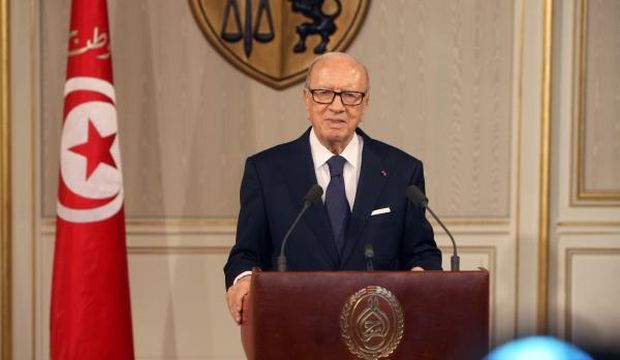
A handout picture released by the Tunisian Presidency’s Press Service on July 4, 2015 shows Tunisian President Beji Caid El-Sebsi speaking during a press conference in the capital Tunis, during which he announced he was declaring a 30-day state of emergency in the country. (EPA/Tunisian Presidency)
Tunis, Asharq Al-Awsat—Tunisia’s President Beji Caid El-Sebsi on Saturday announced a month-long state of emergency in the country, saying Tunisia faced further terrorist threats from extremists following last week’s attack on tourists at a beach resort in Sousse.
Speaking in a televised address, Sebsi said the country “faces a very serious danger and should take any possible measures to maintain security and safety,” warning that if more attacks like last week’s took place, the country would “collapse.”
Speaking to Asharq Al-Awsat on Saturday, Rida Belhaj, Tunisia’s minister for presidential affairs, said the government had received intelligence warning them other terror attacks on the country were being planned.
“The decision by President Sebsi to declare a state of emergency in all Tunisia’s provinces comes as a result of rising terrorist threats including those relating to new attacks on tourist sites,” Belhaj said.
Tunisia’s constitution stipulates that a state of emergency can be declared by the president after consultation with the prime minister, if the country faces an imminent threat to its national security.
The move gives army and police forces wider powers in securing the country against further attacks.
A state of emergency also includes a nationwide curfew, widespread searches on private and public property, and banning public gatherings.
However, Belhaj denied the current state of emergency would impose a curfew, saying the president and the government wished to send a message to terror groups that they were on guard against further attacks and would deal with them in the strongest manner possible.
Last week’s attack in the coastal resort city of Sousse was carried out by a single gunman, 24-year-old Seifeddine Rezgui, who, according to Tunisian officials, received training at a camp run by the Islamic State of Iraq and Syria (ISIS) in Libya. ISIS has claimed responsibility for the Sousse attack.
Thirty-eight people, mostly British tourists, were killed when Rezgui ran through the beach opening fire with a Kalashnikov he had hidden under a parasol. Reports conflict regarding how he bypassed security to get onto the beach, with the most widespread suggestions being he arrived at the beach via boat or jet-ski.
Following the attack, the government announced it was deploying the army and an extra 1,000 police around tourist sites.
An initial government report into the shootings found shortcomings in the security services’ response. A number of officials have now been sacked as a result, including Sousse’s governor and the heads of local security.
The Sousse attack was the second terror attack in the country on tourists in four months. In March another gunman, who trained at the same ISIS camp as Rezgui, killed 22 people, mostly tourists, at the National Bardo Museum outside the capital Tunis.
El-Monji Saidani contributed additional reporting from Tunis.
